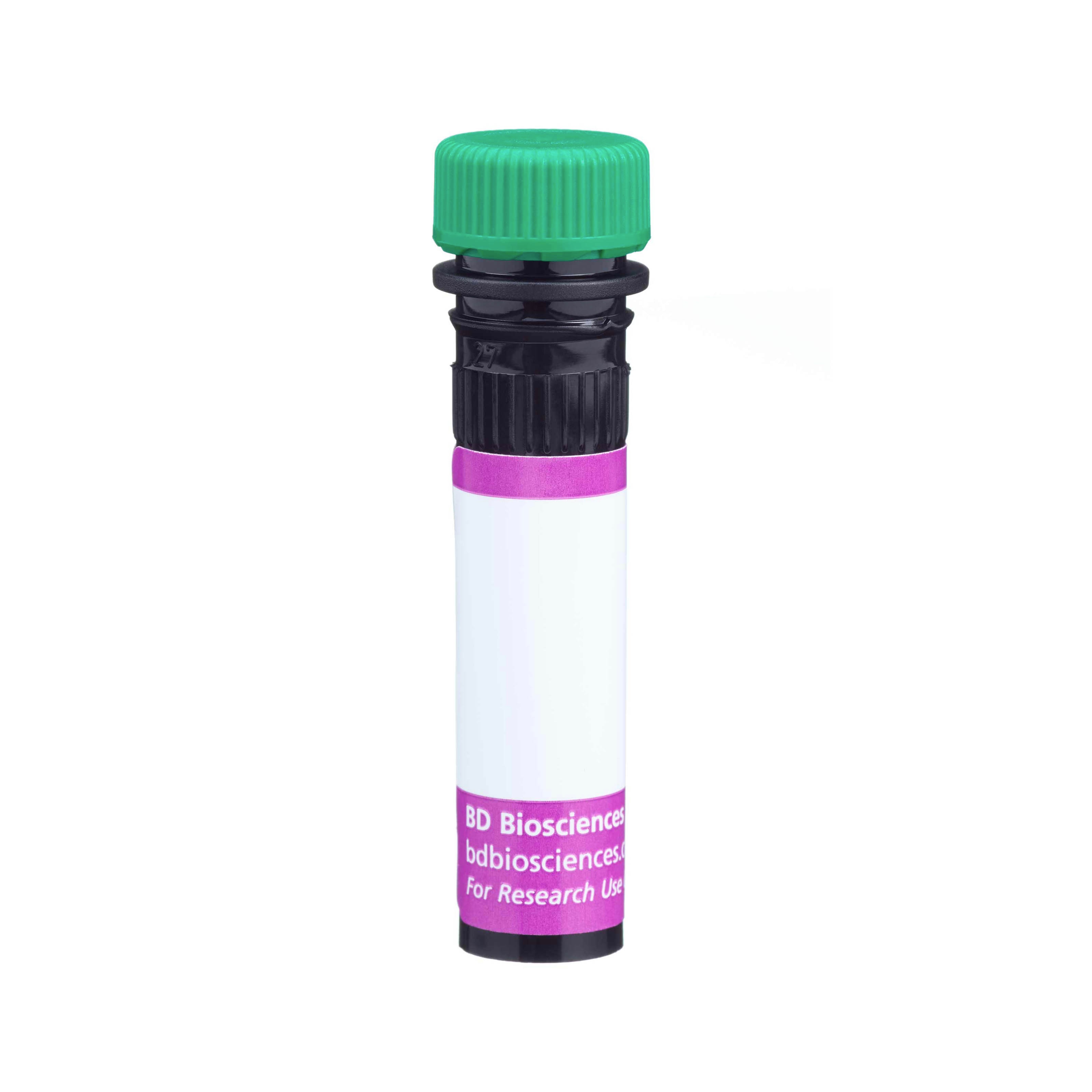Old Browser
This page has been recently translated and is available in French now.
Looks like you're visiting us from {countryName}.
Would you like to stay on the current country site or be switched to your country?


Regulatory Status Legend
Any use of products other than the permitted use without the express written authorization of Becton, Dickinson and Company is strictly prohibited.
Preparation And Storage
Recommended Assay Procedures
For optimal and reproducible results, BD Horizon Brilliant Stain Buffer should be used anytime two or more BD Horizon Brilliant dyes (including BD OptiBuild Brilliant reagents) are used in the same experiment. Fluorescent dye interactions may cause staining artifacts which may affect data interpretation. The BD Horizon Brilliant Stain Buffer was designed to minimize these interactions. More information can be found in the Technical Data Sheet of the BD Horizon Brilliant Stain Buffer (Cat. No. 563794).
Product Notices
- This antibody was developed for use in flow cytometry.
- The production process underwent stringent testing and validation to assure that it generates a high-quality conjugate with consistent performance and specific binding activity. However, verification testing has not been performed on all conjugate lots.
- Researchers should determine the optimal concentration of this reagent for their individual applications.
- An isotype control should be used at the same concentration as the antibody of interest.
- Caution: Sodium azide yields highly toxic hydrazoic acid under acidic conditions. Dilute azide compounds in running water before discarding to avoid accumulation of potentially explosive deposits in plumbing.
- For fluorochrome spectra and suitable instrument settings, please refer to our Multicolor Flow Cytometry web page at www.bdbiosciences.com/colors.
- Please refer to www.bdbiosciences.com/us/s/resources for technical protocols.
- BD Horizon Brilliant Stain Buffer is covered by one or more of the following US patents: 8,110,673; 8,158,444; 8,575,303; 8,354,239.
- BD Horizon Brilliant Violet 480 is covered by one or more of the following US patents: 8,575,303; 8,354,239.
Companion Products






The hIL4R-M57 antibody specifically binds to the α subunit (IL-4Rα) of the human Interleukin-4 Receptor complex which is also known as CD124. The human IL-4Rα, also known as B cell stimulatory factor 1 receptor (BSF-1 receptor), is a 140 kDa transmembrane glycoprotein that is expressed by B and T lymphocytes and a variety of other hematopoietic and non-hematopoietic cells and cell lines. The cell surface IL-4Rα chain binds IL-4 with high affinity and associates with either the common γ chain (IL-4Rα/γc; aka, type I IL-4R complex) or the IL-13 receptor alpha-1 subunit (IL-4Rα/IL-13Rα1; aka, type II IL-4R complex) to form two distinct types of signal-transducing IL-4R complexes. The type I IL-4 receptor complex specifically binds IL-4 whereas the type II IL-4R complex binds and transduces signals from either IL-4 or IL-13. A truncated form of the IL-4Rα exists in soluble form in biological fluids. In contrast to mice, in humans no distinct mRNA coding for sIL-4R has been described, suggested that human sIL4-R is exclusively produced by proteolytic cleavage of the cell surface receptor. The serum levels of soluble IL-4Rα appear to elevate in pathological situations such as allergy and parasitic infections. Depending on the ratios of IL-4 and sIL-4Rα present in the local milieu, the sIL-4Rα may augment or antagonize the activities of IL-4. The immunogen used to generate the hIL4R-M57 hybridoma was soluble human IL-4R.
The antibody was conjugated to BD Horizon™ BV480 which is part of the BD Horizon Brilliant™ Violet family of dyes. With an Ex Max of 436-nm and Em Max at 478-nm, BD Horizon BV480 can be excited by the violet laser and detected in the BD Horizon BV510 (525/40-nm) filter set. BV480 has less spillover into the BV605 detector and, in general, is brighter than BV510.

Development References (6)
-
Agrawal B, Krantz MJ, Parker J, Longenecker BM. Expression of MUC1 mucin on activated human T cells: implications for a role of MUC1 in normal immune regulation. Cancer Res. 1998; 58(18):4079-4081. (Biology: ELISA, Flow cytometry). View Reference
-
Devine PL, Birrell GW, Whitehead RH, Harada H, Xing PX, McKenzie IF. Expression of MUC1 and MUC2 mucins by human tumor cell lines. Tumour Biol. 1992; 13(5):268-277. (Biology). View Reference
-
McGuckin MA, MacDonald KP, Tran M, Wykes M, Hart DNJ. MUC1 Epithelial mucin: expression by normal hematopoietic cells. In: Mason D. David Mason .. et al., ed. Leucocyte typing VII : white cell differentiation antigens : proceedings of the Seventh International Workshop and Conference held in Harrogate, United Kingdom. Oxford: Oxford University Press; 2002:496-499.
-
McGuckin MA. CD227 (MUC1) Summary and Workshop Report. In: Mason D. David Mason .. et al., ed. Leucocyte typing VII : white cell differentiation antigens : proceedings of the Seventh International Workshop and Conference held in Harrogate, United Kingdom. Oxford: Oxford University Press; 2002:494-496.
-
Xing PX, Prenzoska J, McKenzie IF. Epitope mapping of anti-breast and anti-ovarian mucin monoclonal antibodies. Mol Immunol. 1992; 29(5):641-650. (Clone-specific: Blocking, ELISA). View Reference
-
Xing PX, Prenzoska J, Quelch K, McKenzie IF. Second generation anti-MUC1 peptide monoclonal antibodies. Cancer Res. 1992; 52(8):2310-2317. (Immunogen: Blocking, Radioimmunoassay). View Reference
Please refer to Support Documents for Quality Certificates
Global - Refer to manufacturer's instructions for use and related User Manuals and Technical data sheets before using this products as described
Comparisons, where applicable, are made against older BD Technology, manual methods or are general performance claims. Comparisons are not made against non-BD technologies, unless otherwise noted.
For Research Use Only. Not for use in diagnostic or therapeutic procedures.
Report a Site Issue
This form is intended to help us improve our website experience. For other support, please visit our Contact Us page.